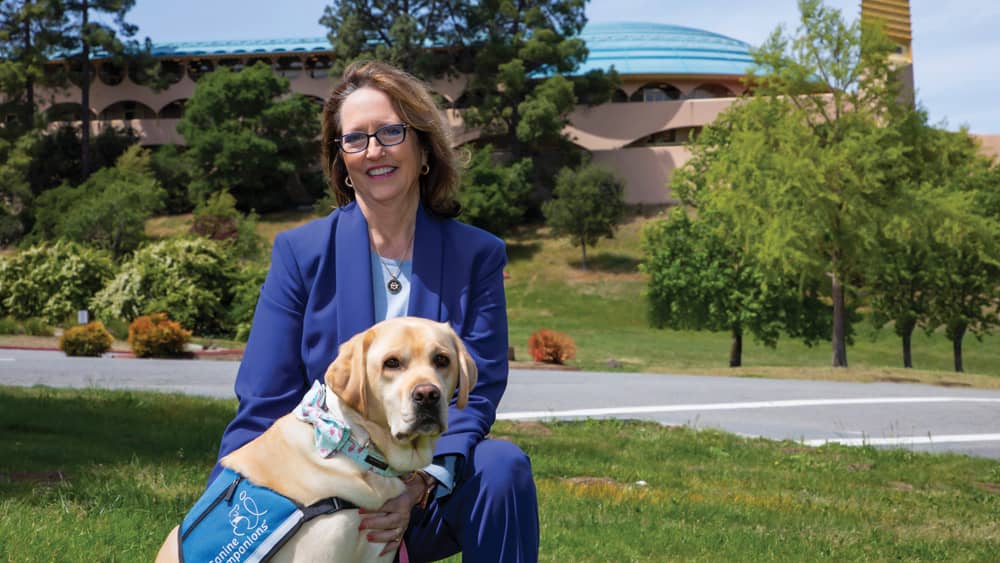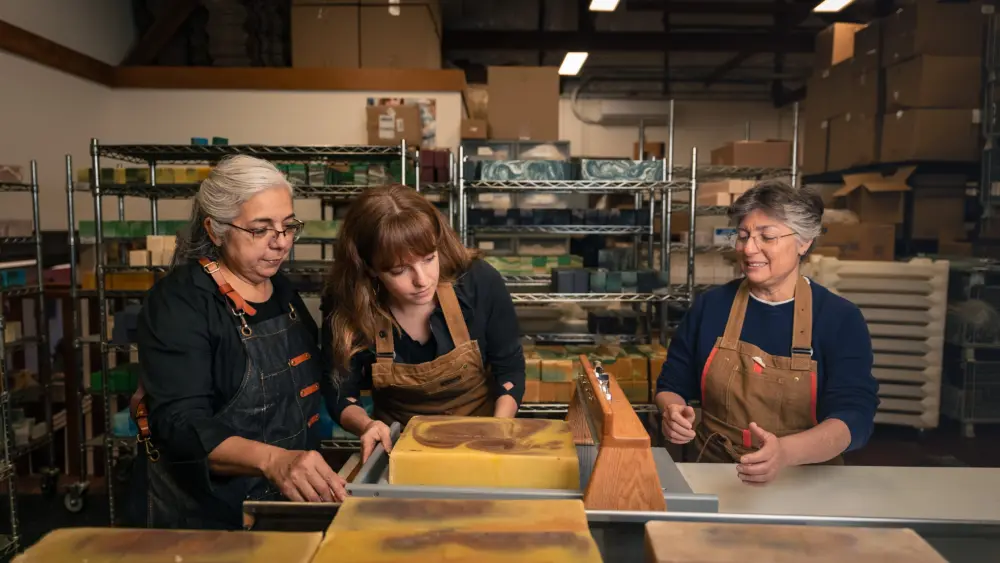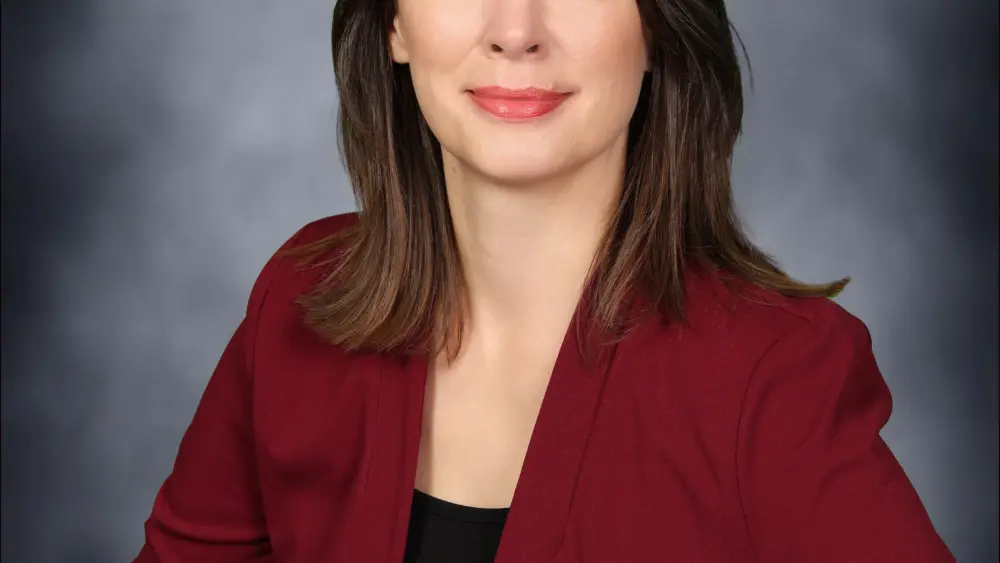
A love for dogs put Marin County District Attorney Lori Frugoli on a career path she never expected. “I thought I was going to be a dog trainer,” she says. When Frugoli was a teenager, she envisioned herself with a future training guide dogs on Fourth Street in San Rafael. Instead, she ended up a few miles away at the Marin County Civic Center as the county’s top legal official. On the surface, the two jobs appear to have little in common, but both involve a deep commitment to helping others and contributing to the community, and those values help define her work as DA.
Career in blue
Frugoli, 65, is a lifelong Marin resident. Her parents were gardeners, and her father wanted to grow roses. When they learned that Luther Burbank had identified Santa Rosa and Marin County as the best places in the area for gardening, they settled in Marin, because it was closer to San Francisco. She attended Terra Linda High School in north San Rafael, and her unanticipated trajectory began when longtime Marin County Supervisor Robert Roumiguière spoke to her government class about working in the public sector and serving the community. Following his talk, she had to write an essay about what she wanted to do when she finished school, and she decided to ride along with police officers with dogs to see what canine units do. The experience changed her vision of policing. “I didn’t understand and appreciate what police officers do,” she says. It inspired her to change course and pursue a career in law enforcement.
After high school, she became an Explorer Scout, a division of Boy Scouts of America at the San Rafael Police Department, getting her first hands-on experience. She processed reports, got to know police officers and sometimes was a part of a ride-along. And, notably, she met her husband, the late Gary Frugoli, who was an officer there. Her first job was as a campus officer at the College of Marin, and after that, she returned to San Rafael, where she was a cadet and reserve officer, who is a second officer in a police car and has some training but limited law enforcement authority. In addition, she was a meter maid and did parking enforcement.
Her goal was to become a full-fledged police officer, but she encountered an obstacle. She was a half-inch short of the 5-foot-6-inch requirement. “I couldn’t get hired anywhere,” she says, but the Marin Community College District Police Department and then Salvatore Rosano, the progressive and visionary chief of the Santa Rosa Police Department from 1974 to 1996, hired her despite the missing half inch. She enrolled in the police academy in 1979. “Our police academy was pretty diverse,” she says, noting that it included a substantial number of women and people of color. When she finally became a bona fide officer, she chose to police the community in downtown Santa Rosa. “I didn’t know Santa Rosa at all when I went to work there,” she says. The chief was ahead of his time and wanted someone on the downtown beat to meet with members of the community and local businesses. “If anything happened, I would respond,” she says. Frugoli served as a hostage negotiator as well. She recalls meeting wonderful people and learning the importance of connecting with the community. “As a leader, I carry the value of that,” she says. Today’s officers and district attorneys need to step back in time, she adds, and take time away from their cars and offices and get to know people.
Fork in the road
Frugoli served with the Santa Rosa Police Department from 1979 until 1985 and continued her education at the same time. She earned her associate’s degree from the College of Marin and a bachelor’s degree from Sonoma State University. Then, she reached a turning point. While she was an undergraduate at SSU, a counselor told her she should go to law school, but she dismissed the suggestion, saying she was finished with school. She enrolled in a computer science class, however, and the counselor spotted her on campus and told her that she obviously was going to continue learning, so she should seriously consider law school. She took his advice this time and enrolled at Golden Gate University in San Francisco. She also left the Santa Rosa Police Department for a job in the Marin County Sheriff’s Office because she needed to spend time on her studies instead of commuting to Santa Rosa from her home in Marin.
In 1990, she became a deputy district attorney in Marin County. “For me, it was a natural progression,” she says. She had spent time in the DA’s office during her career in law enforcement, watching how prosecutors followed through with the work police officers had initiated, and she wanted to be part of that. In addition, her husband had worked on the campaigns of Jerry Herman, who was DA from 1979 to 1998, and she had visited the office and had a sense of what working there would be like. “When I went to law school, there was no question that was what I was going to do,” she says. It allowed her to continue being a public servant. One of her duties as a deputy district attorney was prosecuting cases involving children who had been sexually abused. After a particularly bad case, all the jurors donated their jury service stipend they received to the Jeannette Prandi Children’s Center, which provides a safe environment where children can be interviewed and feel comfortable. “That’s how important the work is,” she says. Frugoli commends the jurors for recognizing the need to protect child victims if prosecutions are to be successful.
In 2018, Ed Berberian, who served three terms like DA, announced that he planned to retire, and Frugoli decided to seek the position. She defeated Anna Pletcher, a former attorney for the U.S. Department of Justice in San Francisco, by a narrow margin of 386 votes in an election in November 2018 and was sworn in as district attorney in January 2019. “I just felt it was the moment in time for change and time for positive change,” she says, explaining that she had a late start because of her previous career, and she wanted a chance to be part of that change and the accountability that comes with being a leader.
New approaches
When she took office, the wall at the entrance to the District Attorney’s Office in the Marin County Civic Center was lined with portraits of everyone who had filled the position before her—all-white males except for Paula Kamena, who served from 1999 to 2004. One of her first acts was to replace the display with artwork that represents the DA’s mission. “It’s really what we needed to see in our front lobby. The biggest, most important thing we do as prosecutors are let the community know who we are and what we do,” she says. That belief also led her to create a new motto: “Connecting the community with the courthouse.” It was the beginning of a new approach that focuses on collaboration and communication, which often results in better outcomes for both victims and offenders. Frugoli explains that prosecutors have a great deal of responsibility when someone is charged with a crime. “We’re the next level for deciding on a person’s future,” she says.
Among the innovations of her tenure is the Clean Slate Program, which gives people who have been convicted of crimes and paid their debt a chance to clear their records, so they can overcome the impediments to leading productive, law-abiding lives. The Clean Slate collaboration includes prosecutors, public defenders, probation officers and the Marin County Department of Health and Human Services alongside other community partners. The team held its first event at St. Andrew Presbyterian Church in Marin City in February, and although the primary goal for most attendees was to apply to the public defender’s office to have their records expunged, they could also take advantage of other services at the same time. Among the opportunities were learning about employment training programs and finding out how to get CalFresh food assistance and Medi-Cal, as well as getting COVID-19 vaccinations. In addition, immigration attorneys and translators were on hand to help where needed. “Clean Slate shows how much we can do together,” says Frugoli. She credits David Sutton, the public defender and social worker, with initiating the program. Deputy District Attorney Otis Bruce, whom Frugoli appointed to the position in 2020, suggested the program be taken to the community as it aligns with the office’s commitment to programs focusing on equity, diversity and inclusion.
In addition, Jerry Coleman heads an immigration relief program as the special deputy district attorney for immigration matters. Anytime a defense attorney informs the District Attorney’s Office that a case involves immigration consequences, a team uses an in-office protocol to review the case to decide whether a person should be granted relief. Frugoli explains that if a DACA recipient is convicted of a DUI, for instance, deportation is automatic. When appropriate, after a team review, a DUI-related disposition can be reached which provides DUI accountability (including fines, fees and DUI school) without the immediate immigration consequences. To gain a better understanding of the issues, the DA’s office put on a mock trial with a real-life DACA recipient as a defendant who talked about the consequences of a DUI. “We do a full top-to-bottom evaluation of the person and the case,” says Frugoli. This allows the prosecutors to make informed decisions. She adds that, in some cases, a prior offense might have been more than 20 years before, and the consequences arrive much later. In such cases, defense attorneys present information showing how individuals have rehabilitated their lives—if they have—and if a previous charge is really old, the team looks at it very carefully and might agree to dismiss it. “I’m talking about people who’ve already paid their debt, and a prior conviction is nagging at them and causing possible consequences,” she says. Frugoli adds that people sometimes think that offenders are escaping accountability, but that’s not so.
One of Frugoli’s priorities, when she took office, was returning forensic examinations for victims of sexual assault to Marin County. Before 2011, nurses at Marin General Hospital did the exams. That year, however, Marin County began contracting Napa Solano Sexual Assault Nurse Examiners (SANE) and the Sexual Assault Response Team (SART), and victims had to go to Kaiser Permanente Vallejo Medical Center, where a specially trained team of nurses did the exams and gathered DNA evidence. She recognizes that women got better service when they went to Vallejo. “I understand why that change was made,” she says. However, some women were reluctant to travel outside the county, and the number of reported assaults dropped. The Marin County Women’s Commission recommended exploring other options in a report in 2017-2018, and Frugoli explains that while it seemed clear that providing services in Marin would be better, it required viewing the situation objectively to conclude that while examinations in Vallejo were good, Marin could do better by working with community partners. The result was a collaborative effort that successfully returned forensic exams to Marin County on March 1, 2022, with deputy public health officer Lisa Santora, M.D., providing support to make it happen.
Santora reports that Frugoli contacted her to discuss the feasibility of creating a response team in Marin County shortly after she was elected, and they began to research opportunities to pilot the return of SART. They visited Sonoma County’s program and learned more about the requirements, and the pilot moved forward. The next step was ensuring the sustainability of the program, which depends on recruiting, training and retaining expert nurse examiners. Marin is now committed to having a minimum of four nurses who have completed a six-month program in Vallejo and are fully trained to do exams. They are available 24 hours a day, every day of the year, and conduct exams at Kaiser Permanente Medical Center in San Rafael. “We are fortunate to have a strong partnership with the Napa Solano SANE and strong, local nursing advocates,” Santora says. She also points out that having a trained nurse examiner locally is critical for collecting evidence and providing expert testimony. The time to travel outside the county might deter traumatized victims from reporting domestic violence or a sexual assault, but with services close to home, they are more likely to go through the process of providing evidence and testifying in court.
“I’m happy we accomplished what we did during COVID,” says Frugoli. However, she has a vision for further improvements. She is working on Commons, a new program in partnership with Measures for Justice, which gives the public access to criminal justice data about local cases online, with the district attorney and community partners deciding what kind of information should be available. It could, for instance, show how many people of color have been arrested in the county, what charges were filed and how those cases were handled in the criminal justice system. A lot of information is already available but having additional data will allow a clearer picture. “This will take it to a deeper level,” she says.
She is asking other agencies, such as the probation department, what they’d like to see, and the community would have a voice as well. “To qualify, you have to have a commons or community group, and we already have it,” she says. Frugoli refers to her office’s current partnerships as well as relationships with organizations such as the ACLU and the League of Women Voters of Marin County. Yolo County has Commons on its website, and Marin hopes to begin offering it in June, making it the third in the nation to do so. In addition, she hopes to implement Stanford University’s Race Blind Charging program, which is a way for prosecutors to reduce bias in charging decisions, either explicit or implicit, using an algorithm that redacts information related to race. “The two programs together would provide a way to be truly transparent,” she says.
Looking ahead
Among her ongoing efforts is reaching out to a new generation. Local high schools participate in mock trial competitions, using the courtrooms at the Marin County Civic Center to play roles in a hypothetical civic or criminal trial. “Every year we have an attorney who volunteers to coach for one of the teams,” says Frugoli. She adds, however, that students don’t get a full picture of all the work the district attorney’s office does when they’re limited to the courtroom. As a member of the Rotary Club of Novato, she has students shadow her on career days, and she takes them on visits to the public defender’s office and the Jeannette Prandi Children’s Center. “They start to see how people work together,” she says. And as they observe the DA’s many responsibilities, they begin to understand that they can effect change in different ways.
Sonoma County District Attorney Jill Ravitch pointed out to Frugoli that a second term allows a DA to follow through with what her office started in the first term, along with telling her that being a DA is the “best job ever,” inspiring her to campaign for reelection in June. Ravich was right on both accounts. “This is my dream job. I just want to continue to do the great work we’re doing,” she says. Dogs also remain in the picture, as she and a friend walk their dogs on one of Marin’s beautiful trails regularly. Being outdoors and with animals is important to her, and “I think it’s important to know how to find your smile,” she says.
Her passion, though, is helping others, and she couldn’t find a better place to do it than the DA’s office.
Mission statement
The Marin County District Attorney’s Office’s primary mission is promoting safety through innovative and collaborative approaches to crime prevention and prosecution while maintaining our commitment to victims’ rights, offender rehabilitation, consumer protection and public engagement.
DA Services
“People don’t know how we’re different from prosecutors on a national or statewide level. We can’t take for granted that people know what we do,” says Marin County District Attorney Lori Frugoli.
Here are some of the special courts and services her office offers.
Services
Community conversations
Consumer mediation/landlord-tenant
Consumer protection unit
Elder abuse prevention program
Family violence
Real estate fraud
Victim witness assistance
Special courts
Drug court
Family violence court
Mental health court
Mental health diversion
Veterans court
In addition, a gun safety program provides information about gun restraining orders and determines if an individual is handling a firearm improperly, which can be important in domestic violence cases. “We don’t want to take people’s guns away, but we do want them to handle them safely,” she says. For people who want to dispose of firearms, a gun buy-back will take place on June 4.
Learn more about the DA’s office at marincountyda.org.



